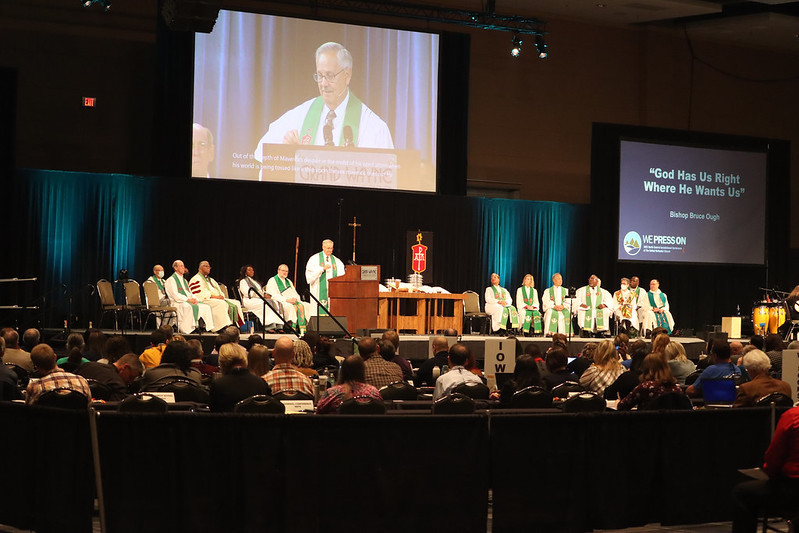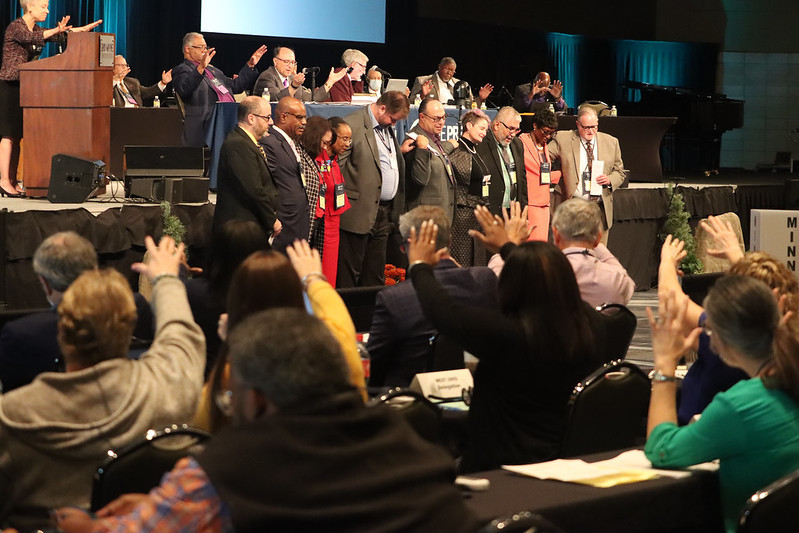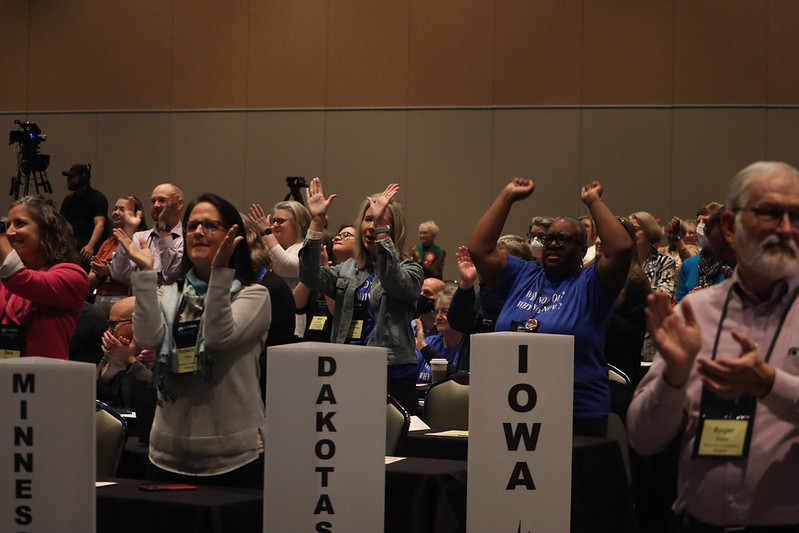
North Central Jurisdictional Conference: What you should know

Bishop Ough delivers the sermon at opening worship at the North Central Jurisdictional Conference on November 2,2022.
The North Central Jurisdictional (NCJ) Conference is in session Nov. 2-5 in Fort Wayne, Indiana. Delegates from the Dakotas, Minnesota, Iowa, Wisconsin, Northern Illinois, Illinois Great Rivers, Indiana, Michigan, East Ohio, and West Ohio Annual Conferences will come together to elect three new bishops after two years of delay due to COVID.
Every four years, the five jurisdictional conferences in the United States (Western, North Central, Northeastern, Southeastern, and South Central) meet following General Conference to elect and assign bishops to replace those retiring. Due to the postponement of General Conference and the inability to gather in person, those elections have been delayed, and some of the current bishops have been asked to provide episcopal oversight for more than one area.
In the Dakotas, we have experienced this with Bishop Laurie Haller and Bishop Deborah Kiesey providing interim coverage for the Dakotas. With the next General Conference now scheduled for 2024, the Council of Bishops requested a ruling from the Judicial Council to determine if they could call a regular session of the Jurisdictional Conference ahead of General Conference. That ruling was in the affirmative and stated that the Council of Bishops could call such a session for the “election and assignment of bishops for the limited purpose of effectuating a continued episcopacy in the United Methodist Church.” So here we are!

Delegates pray for the ten episcopal candidates.
Election of three bishops
In our jurisdiction, which has had nine active bishops in recent years, Bishop Bruce R. Ough and Bishop Sally Dyck retired at the end of 2020 to take positions within the Council of Bishops. More recently, Bishop Laurie Haller announced her retirement effective Dec. 31, 2022. Across the U.S., the recommendation is to elect 14 bishops even though there are 20 vacancies due to retirement. The North Central Jurisdiction was slated to go down by one bishop to eight, but due to the number of bishops expected to retire in 2024, the recommendation is to elect three bishops for the NCJ and stick with nine in 2022. It is anticipated that we will then reduce the number of our bishops and episcopal areas in 2024.
On Saturday, Nov. 5, we’ll find out where each NCJ bishop will be assigned. After two years of the Dakotas having two interim bishops and Minnesota having a different one, the Dakotas-Minnesota Area will share a bishop again beginning Jan. 1, 2023, when the new assignments take effect. The bishop assigned to us could be a newly elected bishop, or a current bishop who is re-assigned from another area. The hope would be that whoever is assigned to us would be re-assigned in 2024 for an additional four-year term so that we would have some continuity of leadership.
Legacy of institutional racism
The election and assignment of bishops is not the only thing occurring at NCJ. Those gathered will be engaged in three conversations in response to the Covenant to Build Beloved Community adopted at the November 2019 Special Called Session of the Jurisdictional Conference. The topics are White Supremacy and Christian Nationalism; Gun Violence; and the Impact of Homophobia, Transphobia and Heterosexism within the United Methodist Church. These are important conversations as we seek to build a more just and inclusive church and world.
Even the fact that we meet as a jurisdictional conference points to a legacy of institutional racism and reminds us we still have work to do in repentance and repair: When the Methodist Episcopal Church North, Methodist Episcopal South, and Methodist Protestant Church merged in 1939 to form The Methodist Church, they created six jurisdictional conferences. Five of them were regional, and there was one that was defined racially. The Central Jurisdiction provided governance for all the Black Annual Conferences, Black churches, and Black clergy in the U.S. The election of bishops was shifted from the General Conference to the six jurisdictional conferences to ensure that bishops would be elected and assigned in a racially segregated manner.
The Central Jurisdiction in the U.S. was eliminated in 1968 as a part of a determined effort to eliminate racial segregation during the merger of the Methodist Church and the Evangelical United Brethren Church into The United Methodist Church. In this time when The United Methodist Church is undergoing significant change, delegates gathering in Fort Wayne will be asked to consider what is ours to do now in that continuing effort to make the church open to all ages, nations, and races, and who they will elect as our spiritual and temporal leaders to guide us in that holy work. This is the call and task of Christian Conferencing, which John Wesley described as a means of grace. May it be so.

Dakotas Conference delegates joyfully participate in opening worship at NCJ.
Dakotas delegates share hopes
Dakotas Conference delegates in attendance are Rev. Rebecca Trefz, Rev. Sara Nelson, as well as Rev. Ray Baker, reserve clergy delegate, and Rev. Jenny Hallenbeck Orr, reserve clergy delegate. Lay delegates are Kara Heagel and Beata Ferris. Here are some of their thoughts on day one of the conference in Fort Wayne.
“I think my hopes really came to life in that opening worship service. As the theme and around the Ezekielen values of the ‘dry bones’ and the worship song to go along with that. I think that was really an articulation of my hopes that even though we have kind of felt we have been in this weary dry land, whether because of the pandemic or the division,” said Rev. Rebecca Trefz, Dakotas Conference clergy delegate. “There is a sense of the spirit moving and reviving us and that as we elect these leaders, they will play a role in it but I hope it’s a calling us all to a revival and to these dry bones living again.”
“My hope is that we can find a way to be united,” said Kara Heagal, lay delegate and head of the delegation for the Dakotas Conference. “I hope that we can prayerfully consider all the things that are going on in general and come away with a clearer vision for who we want to be and what we want to do. I hope that the bishops that we elect align with the values. Whether that is the covenant that we created in 2021, or new ideas that have come out from talking to people.”
Watch livestream of the North Central Jurisdiction Conference | Access daily agenda for NCJ and bishop candidates